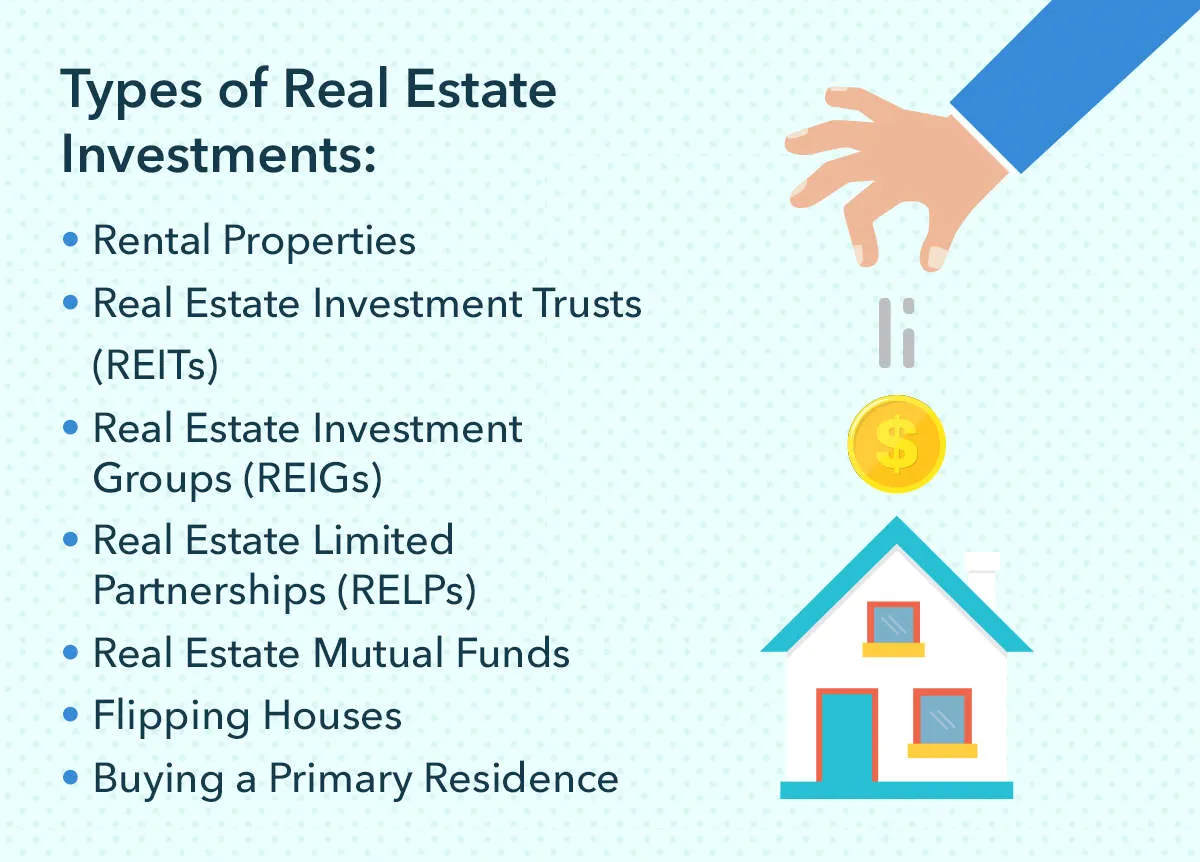Thinking of entering the world of real estate investment? Explore essential tips for beginners to kickstart your journey successfully in the lucrative real estate market.
Why Invest in Real Estate?

Real estate has long been considered a lucrative investment avenue, and for good reason. It offers a unique combination of financial benefits that few other asset classes can match. Whether you’re a seasoned investor or just starting, understanding the compelling reasons to invest in real estate can help you make informed decisions and build long-term wealth.
Here are some key reasons why investing in real estate can be a smart financial move:
1. Potential for Long-Term Appreciation
Historically, real estate has shown a tendency to appreciate in value over time. While there can be short-term fluctuations, well-maintained properties in desirable locations tend to increase in value, building equity for investors.
2. Cash Flow and Passive Income
One of the most attractive aspects of real estate investing is the potential for generating passive income. Rental properties can provide a steady stream of cash flow, helping you cover expenses and even generate surplus income.
3. Tangible Asset with Intrinsic Value
Unlike stocks or bonds, real estate is a tangible asset. You’re investing in a physical property with inherent value. This tangibility can provide a sense of security and stability to your investment portfolio.
4. Tax Advantages
Real estate investors can benefit from various tax deductions and incentives, such as deductions for mortgage interest, property taxes, and depreciation. These tax advantages can significantly enhance the overall return on your investment.
5. Hedge Against Inflation
Real estate is often considered a good hedge against inflation. As the cost of goods and services rises, so do property values and rental income, helping you maintain your purchasing power over time.
Types of Real Estate Investments

Real estate offers a diverse range of investment opportunities, each with its own set of characteristics, risks, and potential rewards. Understanding the different types of real estate investments is crucial for beginners to make informed decisions aligned with their financial goals and risk tolerance. Here are some common types:
1. Residential Real Estate
Residential properties are designed for individuals and families to live in. This category includes:
- Single-Family Homes: Detached houses intended for one family.
- Condominiums: Individually owned units within a larger building or complex.
- Townhouses: Multi-level homes that share walls with adjacent units.
- Multifamily Properties: Buildings with multiple units, such as duplexes, triplexes, and apartment buildings.
2. Commercial Real Estate
Commercial properties are used for business purposes and generate income. Examples include:
- Office Buildings: Spaces designed for businesses to operate.
- Retail Spaces: Properties used for selling goods or services directly to consumers.
- Industrial Properties: Warehouses, factories, and other facilities used for manufacturing, storage, or distribution.
- Hotels: Buildings that provide lodging and other accommodations for travelers.
3. Industrial Real Estate
Industrial properties are a subset of commercial real estate that focuses on properties used for manufacturing, production, storage, and distribution. These properties often require specialized infrastructure and cater to specific business needs. Examples include:
- Warehouses: Large facilities for storing goods.
- Manufacturing Plants: Buildings designed for the production of goods.
- Distribution Centers: Facilities that facilitate the movement of goods.
4. Land
Investing in land involves purchasing vacant land for potential future development or appreciation. Land investments can be categorized as:
- Raw Land: Undeveloped land without any infrastructure.
- Undeveloped Land: Land with basic infrastructure, such as roads and utilities.
5. Real Estate Investment Trusts (REITs)
REITs are companies that own, operate, or finance income-producing real estate. Investors can buy shares in REITs, providing an alternative to direct real estate ownership. REITs typically focus on specific property types, such as:
- Equity REITs: Invest directly in properties.
- Mortgage REITs: Provide financing for real estate.
- Hybrid REITs: Combine elements of both equity and mortgage REITs.
Finding the Right Property

Once you have a budget in mind, you can start looking for properties. This is often the most exciting part for new investors, but it’s important to stay focused on your investment goals and not get caught up in the excitement of property hunting.
Here are a few things to keep in mind when searching for your investment property:
- Location, Location, Location: This mantra holds true in real estate investment. Research areas with strong rental demand, low vacancy rates, and potential for appreciation. Consider factors like proximity to amenities, schools, transportation, and employment hubs.
- Property Type: Determine the type of property that aligns with your investment strategy. Are you interested in single-family homes, multi-family units, condominiums, or commercial properties? Each comes with its own set of advantages and considerations.
- Condition of the Property: Are you looking for a move-in ready property or a fixer-upper? Be realistic about your ability to handle renovations and factor in those costs. A thorough inspection is crucial to uncover any hidden problems.
- Your Investment Strategy: Your investment approach will heavily influence your property choices. If you’re seeking passive income, a rental property in a desirable location makes sense. If you’re aiming for short-term gains, flipping a distressed property might be more appealing.
- Due Diligence is Key: Don’t skip thorough research. Review comparable properties in the area to understand market value. Investigate the property’s history, including any liens or easements. Working with a real estate agent experienced in investment properties can be immensely helpful during this stage.
Financing Your Investment

Once you’ve grasped the fundamentals of real estate investing and honed in on your strategy, a critical step awaits: securing the necessary funds. Here’s a rundown of common financing options for aspiring investors:
Mortgages
Traditional mortgages are widely used for real estate purchases. Be prepared to meet lender requirements like credit score checks, down payment provisions, and debt-to-income ratio assessments.
FHA Loans
Backed by the Federal Housing Administration, FHA loans often appeal to first-time buyers due to lower down payment minimums.
VA Loans
Eligible veterans, active-duty personnel, and surviving spouses can access VA loans with unique benefits, including no down payment prerequisites in certain cases.
Portfolio Lenders
These lenders operate outside conventional bank structures and may offer more flexible lending criteria, potentially suiting investors with unconventional financial profiles. However, interest rates can be higher.
Hard Money Loans
Primarily granted by private lenders, hard money loans are short-term solutions for time-sensitive deals or borrowers with limited credit history. Expect higher interest rates and rigorous qualification standards.
Private Money Lenders
Seeking financing from individuals, often friends or family, can provide tailored loan terms. However, it’s essential to establish clear agreements to safeguard relationships.
Managing Real Estate Properties

Once you own real estate properties, effective management is crucial for maximizing returns and minimizing stress. Here’s what you need to know:
1. Tenant Screening and Management:
Finding reliable tenants is key. Implement a thorough screening process that includes background checks, credit history, and employment verification. Establish clear lease agreements outlining tenant responsibilities and your expectations.
2. Property Maintenance:
Regular maintenance preserves your investment and keeps tenants satisfied. Establish a schedule for routine inspections, address repairs promptly, and budget for long-term maintenance needs like roof replacements or HVAC system upgrades. Consider hiring a property manager if you prefer to delegate these tasks.
3. Rent Collection and Financial Management:
Establish a clear rent collection process, outlining due dates, accepted payment methods, and late fees. Consider online payment platforms for convenience. Accurately track income and expenses, keeping detailed records for tax purposes. Utilize property management software or spreadsheets for efficient financial management.
4. Legal Compliance:
Real estate laws vary by location. Stay informed about local landlord-tenant laws, fair housing regulations, and safety standards. Ensure your properties comply with all applicable regulations to avoid legal issues.
5. Communication is Key:
Maintain open communication with your tenants. Respond to their concerns promptly and address any issues that arise. Foster a positive landlord-tenant relationship to encourage lease renewals and minimize vacancies.
Conclusion
In conclusion, beginner real estate investors should focus on research, start small, and seek guidance from experts to navigate the market successfully.

